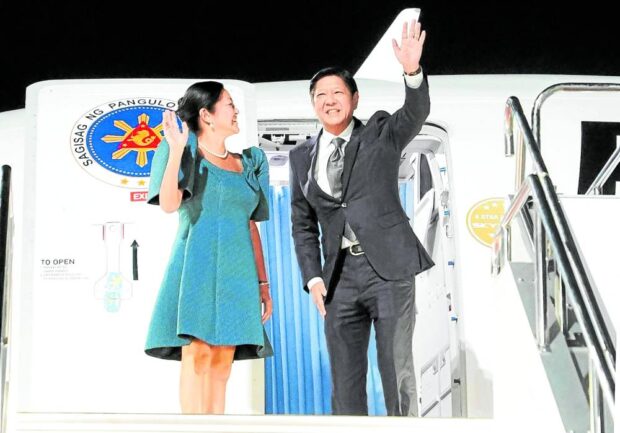Marcos travel fund up 58% at P1.408B; admin hopes to elevate PH position

‘WE NEED TO INTRODUCE OURSELVES FIRST’ President Marcos and first lady Liza Araneta
Marcos leave Japan on Dec. 18 after the President joined the 50th Asean-Japan Friendship Summit.
—MALACAÑANG PHOTO
President Marcos will have P1.408 billion to spend for his local and foreign trips next year, based on Republic Act No. 11975, or the General Appropriations Act of 2024, which he signed on Dec. 20 in Malacañang.
This is 58 percent higher than his 2023 travel allocation of P893.57 million this year.
Mr. Marcos has embarked on 19 foreign trips since assuming office on June 30 last year, 12 of them in 2023.
Presidential Communications Secretary Cheloy Velicaria Garafil earlier said the increase in the requested budget for the President’s local and foreign travels next year would help attract more investments into the country. (See related story on this page.)
Since the lifting by the World Health Organization of the public emergency due to the COVID-19 pandemic, the invitations received by the Office of the President from foreign governments and international entities “have increased significantly,” according to Garafil.
Article continues after this advertisementShe said the trips abroad were “great opportunities to generate more foreign investments” to finance the country’s post-pandemic recovery.
Article continues after this advertisement“At the same time, the administration also hopes to elevate the country’s position in the international community through stronger bilateral ties and improved relations with multilateral or international organizations,” she added.
Budget Secretary Amenah Pangandaman told Malacañang reporters ahead of the budget deliberations this year that the P1.408-billion budget would be worth the investments expected to follow from his trips abroad.
“I think travel expenses, as long as they’re beneficial and advantageous to the country, I think those are okay. It’s justified,” Pangandaman pointed out.
Hectic schedule
This year alone, the President made a dozen trips abroad, starting in January with a state visit to China, followed by his participation in the World Economic Forum in Davos, Switzerland.
In February, he had a working visit in Japan and met with Prime Minister Fumio Kishida in Tokyo.
He then embarked on a five-day official visit to Washington in late April, his second time to the United States since September last year when he first visited the United States as President and spoke before the 77th United Nations General Assembly in New York.
After his US trip, he flew to London in May for the coronation of King Charles III, then went to Labuan Bajo in Indonesia for the 42nd Association of Southeast Asian Nations (Asean) Summit.
Mr. Marcos also embarked on a state visit to Malaysia in July and an official visit to Saudi Arabia in October.
He also participated in the 43rd Asean Summit in Jakarta, Indonesia, and spoke at the Milken Institute’s Asia Summit in Singapore in September.
In November, he returned to the United States for the third time to attend the 2023 Asia-Pacific Economic Cooperation (Apec) Leaders’ Summit. This trip included working visits to Los Angeles and Hawaii.
He was supposed to attend the climate change conference in Dubai this month but canceled his trip a few hours before his supposed departure to personally address “important developments” in the hostage situation involving a cargo ship off Yemen which transported 17 Filipino seafarers.
His most recent trip this year was in Japan for the Asean-Japan Commemorative Summit this month.
Last year, he traveled to Indonesia, New York, Cambodia, Thailand, Belgium, and twice to Singapore.
Malacañang has yet to release the expenses incurred by the government from these trips.
In January next year, the President will visit Vietnam, according to Foreign Secretary Enrique Manalo.
Connection with leaders
Mr. Marcos earlier defended his frequent trips, saying “we need to introduce ourselves first. If we do not travel and introduce ourselves in conferences, we would never be on their minds.”
“I am the new kid in the block, nobody knows who I am. I need to introduce myself. It’s important to have a personal connection with other leaders,” he said in January.
But he also said that month that “We will lessen our trips for the rest of the year. The reason is that we have to review what we started in Asean, in Apec, in China, and our trips to the EU, in Brussels. And then there’s this trip to Davos.”
The President noted in his second State of the Nation Address last July that his trips abroad led to investments that could potentially generate 175,000 jobs.
In September, he again defended his travel, saying that the Philippines needed more investments to boost the country’s economic growth after the COVID-19 pandemic.
“[We] have been going around the world to not only tout the changes that we have had in the Philippines but also to ask what is it that you think you need so that the Philippines becomes an investment-friendly place,” he said in an interview in Singapore with Steven Ciobo, managing director of American investment firm Stonepeak.